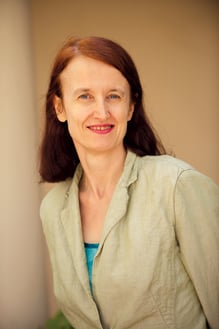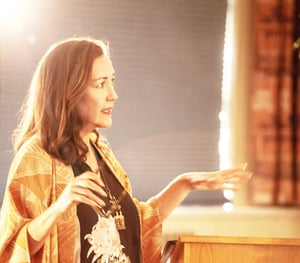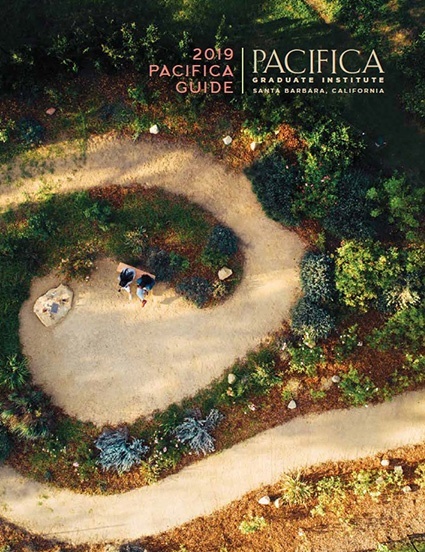An interview by Angela Borda of Mary A. Wood & Susan Rowland, Pt. II of III
Pacifica’s Engaged Humanities and the Creative Life program is led by the dynamic team of Susan Rowland, Ph.D., Jungian scholar, and Mary. A. Wood, Ph.D., a visual arts, writer, and artist mentor, who focuses on Jungian and archetypal approaches to creativity.
How does the low-residency aspect of the program work?
 Susan Rowland: Half of the teaching in this program happens on campus and half online. Students can be anywhere in the world and participate equally. We record lectures, but faculty also interact with the students online. I was doing online teaching yesterday and will be doing some this evening. The students have weekly tasks they have to do and then post their work. We respond in depth and they may respond to us. So it’s not live in the sense of gathering as a class at the same time, but it’s very interactive. The students can do their online work at any time. We have students in Australia, South America, Europe, and they can interact with students who live down the road or on the east coast. We use “Desire To Learn” as our online platform; it’s known commonly as D2L and is utilized by many universities. We customize it, so I’m teaching four courses at the moment. I’m teaching a new course on fairy tales, for which the lecture is recorded, and the discussion board is where the students post their work. I asked them to rewrite Little Red Riding Hood in modern terms, so they’ve posted some of that and then I respond and other students respond to it. So it’s very interactive, dynamic, and relational.
Susan Rowland: Half of the teaching in this program happens on campus and half online. Students can be anywhere in the world and participate equally. We record lectures, but faculty also interact with the students online. I was doing online teaching yesterday and will be doing some this evening. The students have weekly tasks they have to do and then post their work. We respond in depth and they may respond to us. So it’s not live in the sense of gathering as a class at the same time, but it’s very interactive. The students can do their online work at any time. We have students in Australia, South America, Europe, and they can interact with students who live down the road or on the east coast. We use “Desire To Learn” as our online platform; it’s known commonly as D2L and is utilized by many universities. We customize it, so I’m teaching four courses at the moment. I’m teaching a new course on fairy tales, for which the lecture is recorded, and the discussion board is where the students post their work. I asked them to rewrite Little Red Riding Hood in modern terms, so they’ve posted some of that and then I respond and other students respond to it. So it’s very interactive, dynamic, and relational.
"I always say that every student who completes the program finds their own voice... they’re all transformed they’ve all found their inner strength, their inner confidence in a way that is not aggressive but is nurturing to others."
-Susan Rowland
Who comes to Pacifica for this M.A. in Engaged Humanities and the Creative Life? Professional artists? Photographers? Sculptors? Writers? How do you expect that their artistic life will change and grow as they take these courses?
 Mary A. Wood: The program attracts a vast and fascinating range of individuals. One of the biggest misconceptions about the program is that it’s for people who are already known and established in a creative practice—the type of individuals that we normally label as “artists.” About half of our students do have a recognized creative practice of some kind, and some have been very well known in their fields. About half our students do not have a specific creative practice, but they’re passionate about the arts, humanities, and depth psychology. They sense that these passions may come together in a way that will enhance and even transform their lives. We couldn’t agree more. Many of our students come to the program at a point in their lives where maybe their work isn’t serving their soul; something has gone dry or fallow. They may also feel as if they have something else to contribute that has not yet been made manifest in their creative lives. A number of students’ life paths have taken them in directions far from those that they had envisioned earlier in their lives. They yearn to create and have not had the opportunity to do so in a committed manner. As I mentioned, it’s important to remember that a lot of our students don’t fit the typical profile of “artist.” They are CEO’s, financial planners, teachers, therapists, somatic coaches, human resource directors, and more. Through their interest in depth psychology, creative practice, and the humanities (the three pillars of the program), they discover inner creative resources that may have been dormant for a while. Certainly the term “artist” can be intimidating; Jung asserted that creativity is an instinct, and further, that psyche is imagination. We’re all creative and capable of nurturing and enhancing our inherent creativity—for the sake of our souls, and for the soul of the world, the anima mundi.
Mary A. Wood: The program attracts a vast and fascinating range of individuals. One of the biggest misconceptions about the program is that it’s for people who are already known and established in a creative practice—the type of individuals that we normally label as “artists.” About half of our students do have a recognized creative practice of some kind, and some have been very well known in their fields. About half our students do not have a specific creative practice, but they’re passionate about the arts, humanities, and depth psychology. They sense that these passions may come together in a way that will enhance and even transform their lives. We couldn’t agree more. Many of our students come to the program at a point in their lives where maybe their work isn’t serving their soul; something has gone dry or fallow. They may also feel as if they have something else to contribute that has not yet been made manifest in their creative lives. A number of students’ life paths have taken them in directions far from those that they had envisioned earlier in their lives. They yearn to create and have not had the opportunity to do so in a committed manner. As I mentioned, it’s important to remember that a lot of our students don’t fit the typical profile of “artist.” They are CEO’s, financial planners, teachers, therapists, somatic coaches, human resource directors, and more. Through their interest in depth psychology, creative practice, and the humanities (the three pillars of the program), they discover inner creative resources that may have been dormant for a while. Certainly the term “artist” can be intimidating; Jung asserted that creativity is an instinct, and further, that psyche is imagination. We’re all creative and capable of nurturing and enhancing our inherent creativity—for the sake of our souls, and for the soul of the world, the anima mundi.
Susan Rowland: This is a program for people who want to develop their creativity and are interested in using the learning of the humanities and the inspiration of depth psychology and the rejuvenation gained through creative practice, to do so.
Mary A. Wood: Another aspect of the program that sets it apart is that no other institution in the world understands and teaches depth psychology the way that Pacifica does. Depth psychology is a treasure trove for understanding the creative life, what it means to be a creator, and why a creative life can so often be difficult and undervalued. I’ve never found another type of psychology or philosophy that understands, and values, the arts and humanities more than depth psychology does.
Susan Rowland: I don’t think there’s another program in the world like Pacifica’s that combines the three elements of depth psychology, creative practice, and the humanities. They work to enhance one another so effectively. I always say that every student who completes the program finds their own voice, and we’re talking about a wide range of people, students in their 20s, in the military, bringing up families or making a change in their 60s and 70s, and they’re all transformed they’ve all found their inner strength, their inner confidence in a way that is not aggressive but is nurturing to others. That’s really why I’m so invested in the program. It works for all the students who come to it because the material is so psychoactive and inspiring. We teach it so that the students are able to follow their own interests but they’re in a group of people who interact, they have lots of support, they develop their own support, the structure gives them support to explore themselves in a supportive environment to explore quite intense learning about the artist as activist of social change, artists as part of liberation movements. And then the students start to think about the extent to which this might be the way they understand their own creativity. I do a course on arts and nature in which we go very deeply into ideas about relationship to the natural world, looking at the roots of the climate crisis. The course is empowering and it helps to deal with the anxiety that we now have as a culture about the issue.
Can you clarify how this program’s study of archetype and Jung differ from the archetypal psychology taught in Pacifica’s Clinical Psychology program?
Susan Rowland: The Clinical Psychology program is a totally different program meant to train students who will become clinical psychologists. We do not teach our students how to be clinicians. We teach them to access their own creativity and be creative in how they interact with the world. We do not present them with a profession; but rather enable them to define their own futures. Plus the degree teaches skills of deep critical thinking which enables students to negotiate the trickster technologies of the 21st century.
This degree teaches resilience to CHANGE, which is going to be one of the most important skills for adults as we face the Climate Emergency. We teach resilience to change by putting creativity at the core of being so that the student can re-create themselves as well as re-create their work.
Engaged Humanities and the Creative Life is now enrolling for Spring 2020!



